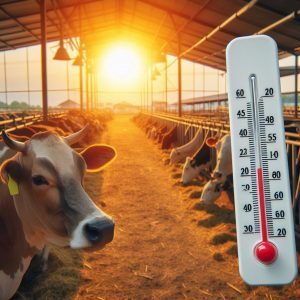When summer heat rolls in, it’s not just farm workers who feel the pressure, your cows do too. Heat stress in dairy herds can have long-lasting effects on udder health, milk yield, and even the next generation of calves.
What Is Heat Stress?
Cows are most comfortable in a thermoneutral zone between 41°F and 77°F. Once temperatures rise with humidity, their bodies struggle to release heat. Signs include faster breathing - over 60 breaths per minute can indicate stress, and elevated rectal temperatures above the normal 101.5°F to 103.5°F range.

Impact on Mammary Development
For heifers and calves, staying within their thermoneutral zone is key for reaching their genetic potential. Heat stress disrupts mammary epithelial cell growth, reducing milk yield later in life. Even calves born to heat-stressed cows may suffer reduced milk production potential, showing how heat can impact multiple generations.
Impact on Udder Function and Health
Heat stress disrupts hormone balance, making the mammary gland more vulnerable during the dry period and lactation. It can lead to:
-
Lower milk production in future lactations
-
Higher somatic cell counts in the bulk tank
-
Increased mastitis risk
Warm, humid weather also encourages the spread of pathogens like Trueperella pyogenes, which thrives with higher fly populations. This type of mastitis can be severe, with symptoms ranging from swollen quarters and fever to off-feed cows and, in extreme cases, death.
Cooling and Prevention Strategies
To protect both udder health and production, farms should implement heat abatement strategies, including:
-
Shade: At least 19 ft² per cow in pastures or open lots.
-
Soakers and Fans: Repeated water soaking combined with air movement in holding pens and barns.
-
Misters and Fans: Evaporative cooling over feed areas to keep cows comfortable while eating.
Remember! water on the cow must evaporate before she lies down to avoid wet bedding, which increases mastitis risk.
Bottom Line
Heat stress isn’t just a summer inconvenience - it affects milk yield, udder health, and herd profitability across multiple generations. Proactive cooling strategies are an investment in both cow comfort and long-term production.
How do you keep your cows cool and protect milk quality during the hottest months?


-

gilbert09
-
Cancel
-
Vote Up
0
Vote Down
-
-
Sign in to reply
-
More
-
Cancel
Comment-

gilbert09
-
Cancel
-
Vote Up
0
Vote Down
-
-
Sign in to reply
-
More
-
Cancel
Children